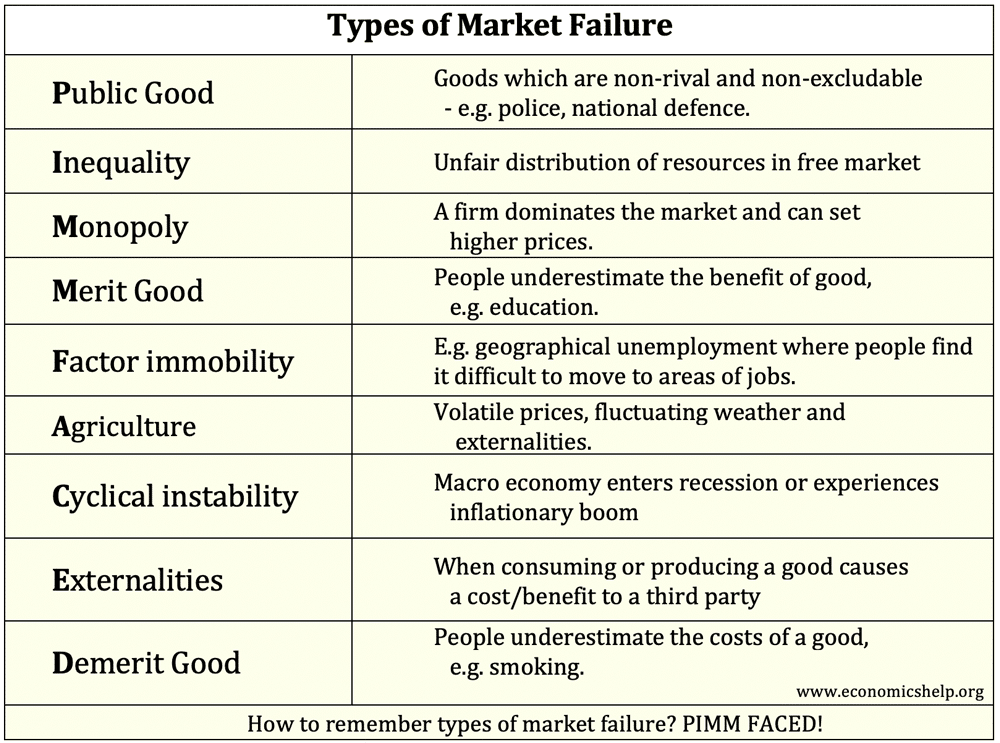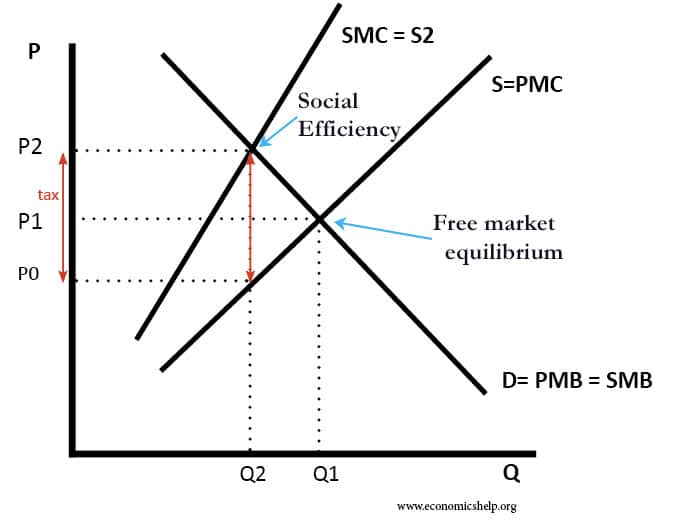Market Failure
Definition of Market Failure – This occurs when there is an inefficient allocation of resources in a free market. Market failure can occur due to a variety of reasons, such as monopoly (higher prices and less output), negative externalities (over-consumed and costs to third party) and public goods (usually not provided in a free market)
Types of market failure
- Positive externalities – Goods/services which give benefit to a third party, e.g. less congestion from cycling.
- Negative externalities – Goods/services which impose a cost on a third party, e.g. cancer from passive smoking.
- Merit goods – People underestimate the benefit of good, e.g. education. It may also have positive externalities
- Demerit goods – People underestimate the costs of a good, e.g. smoking. It may also have negative externalities.
- Public Goods – Goods which are non-rival and non-excludable – e.g. police, national defence. Public goods are often not provided in a free market.
- Monopoly Power – when a firm controls the market (with high market share) and can set higher prices.
- Inequality – unfair distribution of resources in free market, e.g. some experiencing poverty and homelessness
- Factor Immobility – E.g. geographical / occupational immobility. For example, when there are pockets of high unemployment, but it is difficult for the unemployed to move and get a job.
- Agriculture – Agriculture is often subject to market failure – due to volatile prices, fluctuating weather and externalities.
- Information failure – where there is a lack of information to make an informed choice.
- Principal-agent problem – Two agents with different objectives and information asymmetries. For example, adverse selection where a buyer has less information than the seller.
- Moral hazard. When individuals have incentive to change their behaviour when others take the risk. For example, when banks are insured by the government, bankers take risky decisions which can cause bank losses.
- Macroeconomic instability – When an economy enters into prolonged recession and high unemployment – or inflationary boom which is unstable.
A way to remember several types of market failure

- Externalities: These occur when a third party is affected by the decisions and actions of others.
- Social benefit: the total benefit to society =
Private Marginal Benefit (PMB) + External Marginal Benefit (XMB)
- Social Cost: is the total cost to society =
Private Marginal Cost (PMC) + External Marginal Cost (XMC
- Social Efficiency: This occurs when resources are utilised in the most efficient way. This will occur at an output where social marginal cost (SMC) = Social Marginal Benefit. (SMB)
Overcoming Market Failure

- Tax on Negative Externalities – e.g. Petrol tax
- Carbon Tax e.g. tax on CO2 emissions
- Subsidy on positive externalities – why the government may subsidies public transport
- Laws and regulations – Simple and effective ways to regulate demerit goods, like a ban on smoking advertising.
- Buffer stocks – aim to stabilise prices
- Government failure – why government intervention may not always improve the situation
Market failure and behavioural economics
Behavioural economics examines how individuals often act in a non-rational manner – contrary to the expectation of conventional economic models. These types of ‘irrational behaviour’ can lead to a type of market failure where people make poor choices. For example.



